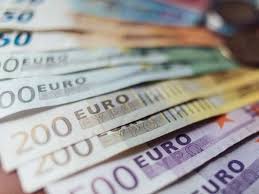
A small decline in the dollar provided some relief to the euro, allowing it to move away from two-decade lows recorded this week after surging oil costs fueled recession fears.
Risky assets, like the euro, gained ground gradually on Thursday as investors weighed the chances of a recession and a delay in interest rate hikes.
Meanwhile, implied volatility in the FX market was remained at its highest level since late March 2020, at 11.2 per cent, showing a jittery market as investors focused on the euro-dollar parity.
"Parity is within reach, and one can expect the market to want to see it now," said Moritz Paysen forex and rates advisor at Berenberg.
After touching a two-decade low of 1.01615 on Wednesday, the euro gained 0.2 per cent to 1.02.
According to George Saravelos, global head of forex research at Deutsche Bank, "if Europe and the U.S. slip-slide into a recession in Q3 while the Fed is still hiking rates, these levels (0.95-0.97 in EUR/USD) could well be reached."
"The two key catalysts to mark a turn in the USD embedded in our forecasts are a signal that the Fed is entering a protracted pause in its tightening cycle and/or a clear peak in European energy tensions via an end to Ukraine hostilities," he said.
The dollar index, which compares the US currency to six other currencies, fell 0.2 per cent to 106.88, moving away from Wednesday's top of 107.27, a level not seen since late 2002.
Commodity currencies gained strength when copper prices rose. On Thursday, some investors returned to the market after heightened recession fears drove the red metal to its lowest level in nearly 20 months.
The Australian currency gained 0.7 per cent to 0.6822 versus the US dollar after falling to its lowest level since May 2020 at 0.6762.
The Swiss franc remained just above its best level since 2015 against the euro, at 0.9872.
Earlier this week, inflation rose above the Swiss National Bank's (SNB) 0-2 percent goal range for the fifth consecutive month, fueling speculation that the central bank may soon tighten policy. It raised its policy rate for the first time in 15 years last month.
The SNB has indicated that it is willing to see the Swiss franc appreciate in order to stifle imported inflation.
The pound climbed against a weakening dollar on Thursday, after falling to a more than two-year low the day before, as Prime Minister Boris Johnson clung to power despite the resignation of key cabinet members.
Sterling gained 0.5 per cent to 1.1977, while the euro gained 0.2 percent to 85.21 pence.
According to analysts, the pound was primarily affected by larger economic concerns about a worldwide recession, rather than Britain's political turmoil.
Bitcoin slid 0.7 per cent to $20,402 at the time of writing. Ether dropped 0.8 per cent to 1,176.
(Source:www.business-standard.com)
Risky assets, like the euro, gained ground gradually on Thursday as investors weighed the chances of a recession and a delay in interest rate hikes.
Meanwhile, implied volatility in the FX market was remained at its highest level since late March 2020, at 11.2 per cent, showing a jittery market as investors focused on the euro-dollar parity.
"Parity is within reach, and one can expect the market to want to see it now," said Moritz Paysen forex and rates advisor at Berenberg.
After touching a two-decade low of 1.01615 on Wednesday, the euro gained 0.2 per cent to 1.02.
According to George Saravelos, global head of forex research at Deutsche Bank, "if Europe and the U.S. slip-slide into a recession in Q3 while the Fed is still hiking rates, these levels (0.95-0.97 in EUR/USD) could well be reached."
"The two key catalysts to mark a turn in the USD embedded in our forecasts are a signal that the Fed is entering a protracted pause in its tightening cycle and/or a clear peak in European energy tensions via an end to Ukraine hostilities," he said.
The dollar index, which compares the US currency to six other currencies, fell 0.2 per cent to 106.88, moving away from Wednesday's top of 107.27, a level not seen since late 2002.
Commodity currencies gained strength when copper prices rose. On Thursday, some investors returned to the market after heightened recession fears drove the red metal to its lowest level in nearly 20 months.
The Australian currency gained 0.7 per cent to 0.6822 versus the US dollar after falling to its lowest level since May 2020 at 0.6762.
The Swiss franc remained just above its best level since 2015 against the euro, at 0.9872.
Earlier this week, inflation rose above the Swiss National Bank's (SNB) 0-2 percent goal range for the fifth consecutive month, fueling speculation that the central bank may soon tighten policy. It raised its policy rate for the first time in 15 years last month.
The SNB has indicated that it is willing to see the Swiss franc appreciate in order to stifle imported inflation.
The pound climbed against a weakening dollar on Thursday, after falling to a more than two-year low the day before, as Prime Minister Boris Johnson clung to power despite the resignation of key cabinet members.
Sterling gained 0.5 per cent to 1.1977, while the euro gained 0.2 percent to 85.21 pence.
According to analysts, the pound was primarily affected by larger economic concerns about a worldwide recession, rather than Britain's political turmoil.
Bitcoin slid 0.7 per cent to $20,402 at the time of writing. Ether dropped 0.8 per cent to 1,176.
(Source:www.business-standard.com)





